The most effective weed control measures
Weed grass can infect crops like a disease, and then lead to death. And it is difficult to fight this ailment, it is better to prevent it than to cure it. If this is not done, then cultivated plants may die, since there is not enough food for them, everyone will take harmful plants. To fight weeds there are several methods, each of which is effective in its own way.
Outline of the article:
- Agrotechnical measures in weed control
- Biological methods for weed control
- Chemical weed control
- Popular methods of weed control in the garden
Agrotechnical measures in weed control
In order for weeds not to appear and not to take full control of the fields and vegetable gardens, it is necessary to carry out a number of preventive measures:
- Chopping the roots of weeds before plowing the land is especially helpful in case of abundant soil contamination.
- In the southern regions, where the heat is all the time, the struggle with the rhizomes of weeds is carried out by drying them in the sun for a month, only then these plants become unviable.
- When plowing a plot in autumn, the roots of many harmful plants end up on the surface of the garden and freeze out during the winter.
- It is also good to clear areas of weeds in the fall and burn them together with seeds.
The most widespread method is simple deletion weeds and their roots with a hoe or with your hands. In addition, thanks to this method, it is possible to additionally loosen crops, creating conditions for entering root system air and nutrients.
But the main condition for the effectiveness of the method is the complete destruction of the weed root system.
Otherwise, after a while, the weeds will start an offensive again. Many gardeners simply mow weeds at the root several times per season. This is beneficial when the roots of the weeds lose strength and die. Using agricultural technology as a way to control weeds, summer residents can completely clear plots of pests.
Biological methods for weed control
For the biological method, the main thing is to improve the life of developing and growing cultivated plants in comparison with harmful ones. Thus, there is a gradual suppression of weeds by useful crops. The rapid emergence from the soil and accelerated growth lead to the fact that grain crops, buckwheat, peas do not allow weeds to grow. And here potato, many vegetables grow slower than weeds, so these control methods will not work in these areas.
Many biologists advise using insects, called phytophages, to control weeds, which feed on leaves, roots, fruits and seeds of such difficult-to-remove weeds: sow thistle, field bindweed, and thistle. Some types of leaf beetles and humpbacks belong to the eaters. They destroy only a certain type of plants, without having a fatal effect on nearby cultivated crops.
Scientists have developed methods to combat harmful grass using some bacteria and fungus that do not harm the human body or beneficial green crops.
Many representatives of the fauna also help humans to fight against soil contamination.
These include some types of poultry and wild birds: ducks, geese. One of the types of biological defense is mulching, or sheltering plantings with both organic and synthetic products. Materials for this method include:
- Spreading shredded leaves a few centimeters thick and holding them in the air for a long time before they can be used as mulch.
- Will help in mulching shredded newsprint or bark. They are good for vegetable crops.
- Spreading straw or needles between the beds will help, but they must be used carefully, as they increase the acidity of the soil. Hay in such cases cannot be used, since weed seeds are often hidden in it.
- Organic mulching in the form of composting into the soil will not only save you from weeds, but also ennoble the soil, replenish it with nutrients, and help the plants grow stronger.
- Most often, mulching is carried out in early spring, while the earth has not warmed up, or in the fall after weeding or plowing. For young plants, this method is unacceptable, because mulch can simply suffocate them.
Biological methods of weed control are characterized by a positive effect on cultivated plants, the absence of infection of the human body, which allows the ecology to remain clean.
Chemical weed control
But very often there are situations when it is impossible to clean the contaminated area without chemicals. This happens if the weeds have a powerful root system, which will not take any digging and even deep plowing.
Soil erosion is also the reason for carrying out chemical action on weeds. But at the same time, the procedure for the chemical destruction of weeds must be carried out in accordance with the rules for observing the terms, methods of administration and safety measures.
Chemical weed control drugs include herbicides both organic and inorganic origin.
Usually herbicides selectively fight weeds, although they are also used that remove completely vegetation that freely lives along fences, along the sides of vegetable gardens. The most effective drugs include those that contain phenoxy acids or picloram. The time of application of substances is determined in accordance with their properties and duration of action. Herbicides are actively used all over the world, because their weed control is more successful and does not allow weeds to revive.
Popular methods of weed control in the garden
Summer residents sometimes invent themselves, as it seems to them, interesting ways to combat weeds, although they have long been known to biologists.
Here are a few, according to gardeners, the most effective of them:
- Any plant will die if it is deprived of its light. Hence the conclusion: cover the area with black film, and on top with a layer of straw or last year's leaves.
- The crops of mustard do not allow weeds to grow, and they die without developing.
- In places where there are a lot of weeds, you can lay out paving slabs or make lawns, enriching them with alpine slides. In this case, two birds with one stone can be killed: ennoble the territory, and lime weeds.
- Many people prefer to use chemical agents as the most reliably killing weeds without subsequent revival.
- Non-traditional methods of control include sprinkling weeds with salt or quicklime. But these methods cannot be used on land for crops, otherwise the soil will contain substances harmful to cultivated plants.
To take preventive measures against the appearance of weeds, it is necessary to carefully introduce organic matter into the soil. It is she who can infect the area with weeds.Before using it, manure must be allowed to mature so that the seeds that have got into it from the hay can die.
On their site, everyone can choose the measure of combating weed tormentors, which will not destroy the crops, and will not harm either the environment or health.
More information can be found in the video.



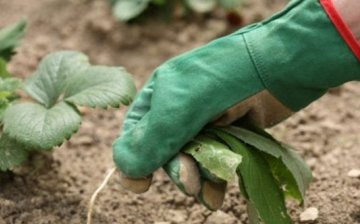
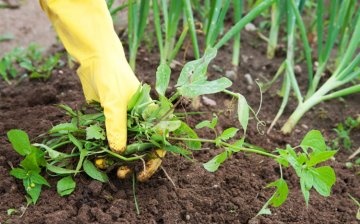
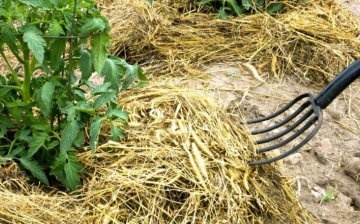
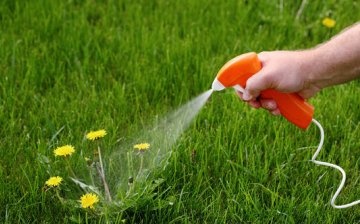
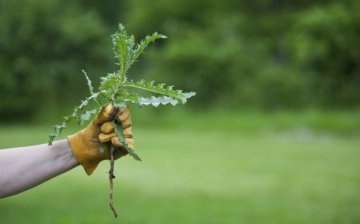





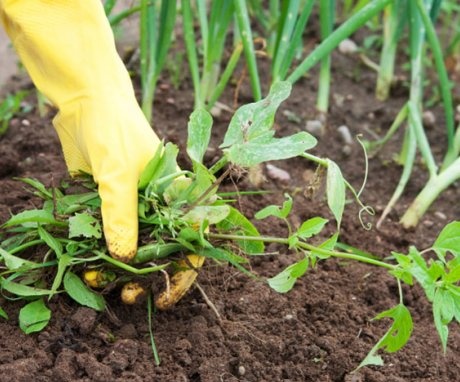
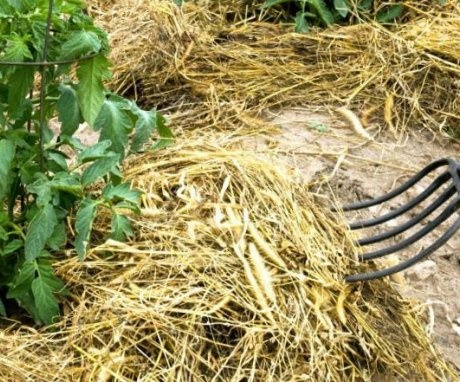
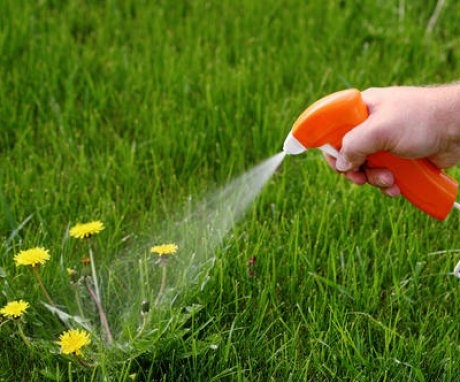
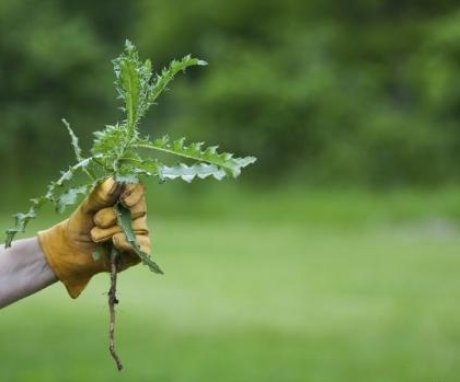
I believe that the most effective method of weed control will be weeding and mulching, and you can mulch with black plastic wrap and the weeds will not grow at all. In addition, the plastic wrap will retain moisture and the soil will not dry out.
For me, the most effective way to control weeds was and is weeding with a hoe. If the garden is not very large, then this is not such a painful task. I don't trust chemicals. If it is possible to do without them, then I do so. I do not want to destroy the whole vegetable garden along with the weeds.